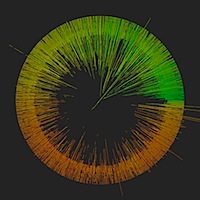 by blprnt_van
by blprnt_van
Reaching Agreement On The Public Domain For Science
[Via Common Knowledge]
Photo outside the Panton Arms pub in Cambridge, UK, licensed to the public under Creative Commons Attribution-ShareAlike by jwyg (Jonathan Gray).
Today marked the public announcement of a set of principles on how to treat data, from a legal context, in the sciences. Called the Panton Principles, they were negotiated over the summer between myself, Rufus Pollock, Cameron Neylon, and Peter Murray-Rust. If you’re too busy to read them directly, here’s the gist: publicly funded science data should be in the public domain, full stop.
[More]
and this
BBC News – Science damaged by climate row says NAS chief Cicerone
[Via BBC News | Science/Nature]
Leading scientists say that the recent controversies surrounding climate research have damaged the image of science as a whole.
President of the US National Academy of Sciences, Ralph Cicerone, said scandals including the “climategate” e-mail row had eroded public trust in scientists.
[snip]
He said that this crisis of public confidence should be a wake-up call for researchers, and that the world had now “entered an era in which people expected more transparency”.
“People expect us to do things more in the public light and we just have to get used to that,” he said. “Just as science itself improves and self-corrects, I think our processes have to improve and self-correct.”
[More]
It is important for Federally funded research to be in the public domain. But, Universities, who hope to license the results of this research, and corporations, who will not as likely commercialize a product if they can not lock up the IP, Both of these considerations must be accounted for if we want to translate basic research into therapies or products for people.
So, as the Principles seem to indicate, most of this open data should happen AFTER publication, so this would give the proper organizations to make sure they have any IP issues dealt with.
But what about unpublished data? What about old lab notebooks? The problem supposedly seen now has nothing to do with data that was published. It has to do with emails between scientists. Is this relevant data that should be made public for any government funded research?
Who determines which data are relevant or not?
And what about a researcher’s time? More time in front of the public, more time filling out FOIs, more time not doing research in the first place.
The scientific world is headed this way but how will researcher’s adjust? There will have to be much better training of effectively communicating science to a much wider audience than most scientists are now comfortable with.
Don’t know if you’ve seen this one, but it points out a lot of the technical issues that surround data sharing, particularly the question of how well different types of data translate between different experiments:
http://www.the-scientist.com/2009/04/1/33/1/